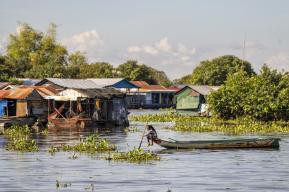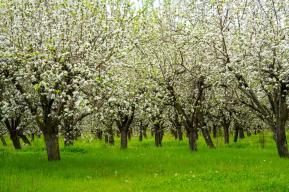
UNESCO Earth Network
Connecting sites with scientists to boost biodiversity
The Earth Network mobilises experts from across the spectrum of environmental knowledge to help countries and communities achieve their biodiversity goals. This project is developed by UNESCO with the support of the Government of Italy.
The Earth Network acts as a matchmaking tool: it connects UNESCO-designated sites facing ecological challenges, including climate change, with leading scientific experts who can help them find tailor-made solutions. Once a team of specialists is assembled, they are sent on mission to UNESCO-designated sites to work hand in hand with local communities.

As the Earth Network develops, its results and projects will form a database of proven environmental solutions that can be replicated, adapted or scaled up to combat biodiversity loss across the world.
2,000+ sites
Request an Earth Network mission
Through the UNESCO Earth Network project, UNESCO-designated sites and some candidate sites can receive the help of volunteer experts to support capacity needs related to ecological restoration and reconciliation of human and nature relationships.

Join the Earth Network expert roster!
Young volunteer experts, particularly among UNESCO-designated sites and networks, are encouraged to apply, as well those from indigenous and local communities.

Donate and support
Contributions from individual donors are pooled into the Multi-Partner Trust Fund created to support the programme. Donors contributing more than USD 200,000 will serve on the Steering Committee, which will provide strategic direction and advice to the program. In addition, two Steering Committee seats will rotate annually among donors contributing less than USD 200,000.
For more information, please contact Manoel Giffoni, Associate Project Officer.

The Earth Network project benefits from the support of the Governement of Italy

Learn more about the subject
FAQs
The UNESCO Earth Network provides solutions and advice to Member States and communities who are looking for solutions to accelerate ecosystem regeneration and the protection of biodiversity. The Earth Network dispatches scientific experts across UNESCO designated sites, upon their request, to tackle issues related to biodiversity loss, ocean and land degradation, and climate change adaption and mitigation.
Through the “UNESCO Earth Network of Experts", training related to the restoration and conservation of ecosystems in biosphere reserves, global geoparks, natural heritage sites and elements of the Intangible Culture Heritage will be provided.
The Earth Network :
- Supports UNESCO-designated sites/elements to promote transformative actions within their territories
- Gathers and facilitates access to data on the UNESCO-designated sites/elements
- Generates and consolidates scientific, local and indigenous knowledge
- Empowers local communities, particularly the youth, to promote transformative change in their territories
Ultimately, the Earth Network’s goal is to use sound scientific research, not only to demonstrate that living in harmony with nature is possible, but moreover that exceptional sites in hundreds of countries around the world have already achieved this reconciliation.
The Earth Network opens the door to transformative actions within territories to regenerate human-nature relationships exploring the links between the several components of the Earth’s system, contributes to the implementation of the UNESCO intersectoral biodiversity strategy and to internationally agreed commitments of Member States, including the 2030 Agenda for Sustainable Development, the Decade of Ecosystem Restoration, the Decade of Ocean Science for Sustainable Development and the Post-2020 Biodiversity Framework.
Being part of this network means:
- Sharing your expertise for the benefits of local and global communities through pairing with experts and youth, including indigenous knowledge holders
- Facilitated access to volunteering in UNESCO designated sites via field missions
- Knowledge and capacity-sharing among a unique network of designated sites and global research networks (UNITWIN/UNESCO Chairs Programme)
- Enhancing open access to research, projects, good practices solutions and positive environmental outcomes through UNESCO networks communication services, including media partnerships, social media, etc
You may have expertise and experience in other types of sites (e.g., protected areas) that are transferrable to UNESCO sites and elements. Your expertise should match the needs of the participating sites and within the relevant fields as listed in the call, including indigenous and local knowledge holders.
We welcome all applications including Young Experts living and working in UNESCO-designated sites and/or trained and currently engaged with UNESCO Chairs and other relevant UNESCO scientific networks.
Yes, experts shall be fluent in one of the UNESCO working languages and UNESCO will as far as possible match the needs of the sites with languages skills if this can further help the support to the site.
You must specify your availability (when and how long).
You can find the forms at the following links:
There is no specific format; the letters may be from the host institution and may for instance refer to expertise with UNESCO designated sites and elements.
You will receive a confirmation of your application by e-mail and will be contacted once the first round of the selection process is completed.
Volunteer Experts and Young Volunteer experts will work on a voluntary basis and no stipend will be offered. Only costs related to field missions (i.e., travels, boarding and lodging) and costs directly associated with organizing workshops and online sessions will be covered by the fund of the UNESCO Earth Network programme.
In case you are selected for a specific action, you will be considered a consultant for UNESCO. The terms of reference of this consultancy will be based on your application (e.g., time availability, scope of actions, etc.)
Often referred to simply as MPTFs, these pooled funding mechanisms offer a flexible, collaborative and efficient way to support Sustainable Development Goals (SDG) financing to make sure no-one is left behind.
As put by the United Nation’s Secretary General Antonio Guterres, “pooled funding mechanisms have a strong track-record in strengthening coherence and coordination, broadening the contributor base, improving risk management and leverage, and provide better incentives for collaboration”.
The establishment of the Earth Network was made possible thanks to Italy’s catalytic initial contribution of USD 3.9 million over a period of 3 years. The fund has a global mobilisation target of USD 20 million over an initial period of 4 years.












